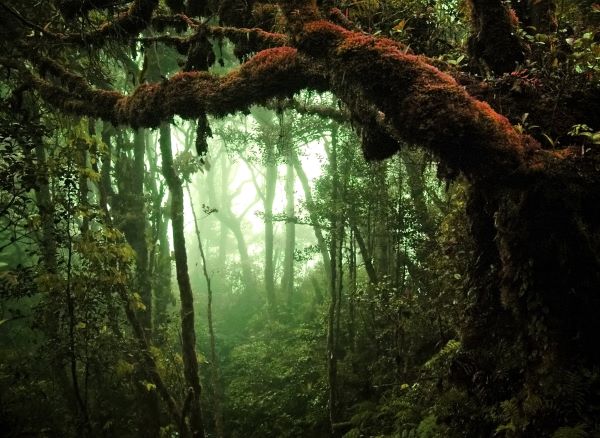






Siblings Survive 40 Days in Jungle. Here It’s “Don’t Let Kids Cross Street till Age 10”
Emergency workers recently rescued four siblings between the ages of 1 and 13 who had survived in the jungles of Colombia for 40 days after their plane crashed. Much of the public responded with considerable dumbstruck awe: How could kids that young be that resourceful?
“My response is: They do this routinely,” says anthropologist David Lancy, author of Child Helpers: A Multidisciplinary Perspective, and other books about kids in other cultures. “They look after their brothers and sisters, including babies. They hunt. They forage. They build shelters.”
In short: They put us to shame.
All the adults died in the crash.
The children—Lesly (13), Soleiny (9), Tien (4), and Cristin, who had his first birthday during this ordeal—were traveling with their mother, uncle, and a pilot on a small plane when its engine died. It crashed into one of the most remote regions of the Amazonian jungle on May 1.
Their mother survived for four days. After that, with all the adults dead, the kids were on their own in a forest filled with poisonous plants, venomous snakes, ravenous jaguars, and about 16 hours of rain each day. That’s not to mention the drug traffickers and militias.
When searchers reached the plane 16 days after it crashed, they assumed all aboard had died, until one asked: Where are the bodies of the children?
When the team realized the kids had survived, the Colombian government organized a massive search. It began with members of the military, but soon they were joined by 200 local indigenous people. Normally, the two groups are mortal enemies. But on this mission, more than 300 people worked as a team.
The jungle is dark and loud.
The search was made insanely difficult by the density of the forest canopy, which lets in little light. The near-constant rain made it almost impossible to follow tracks or yell loudly enough for the kids to hear. The searchers played tapes of the children’s grandmother telling the kids that adults were looking for them. They also dropped 10,000 leaflets giving the kids encouragement and advice.
It’s unclear whether they needed any.
By all accounts, 13-year-old Lesly took charge. She was raised by her grandmother in a remote village and learned to cook at age 8. When her parents were off working, she often took care of her siblings.
After the kids ate a sack of cassava flour they salvaged from the plane, Lesly led them off to hunt and gather. They took with them some clothes, a tarp, mosquito netting, a flashlight, and a music box.
How the children ate, drank, and hid.
In the jungle, they collected water in a soda bottle and ate avichure (something like passion fruit) and milpesos (which supposedly taste like avocados). They hid in tree trunks to avoid predators. Lesley made shelters from branches held together with hair ties.
Searchers traversed over 900 miles looking for the children, at one point passing within 200 feet of them. In the end, the kids were found about four miles from the crash.
When children grow up in indigenous cultures, far from modern anything, they learn the skills of life “by practice, observation, paying attention, listening, not being the center of attention, and being under an obligation from birth to help out and aspire to be like the adults,” says Lancy.
What those kids had that our kids don’t.
Meanwhile, in our country, we legally prevent kids from developing that resourcefulness. Our authorities investigate and sometimes even arrest parents who let their children walk half a mile or spend six minutes alone in the library. (You can help fight those laws by joining our advocacy efforts.)
This wild overestimation of danger and underestimation of kids goes so deep that the American Academy of Pediatricians (AAP) put out a white paper a few years ago with this warning: “Young children have developmental limitations that prevent them from being safe pedestrians.”
Thanks to all those limitations, the AAP “recommends that children should not be unsupervised pedestrians before 10 years of age, except in limited situations.”
I’m guessing those limited situations do not include 40 days unsupervised in the jungle.




“…not being the center of attention, and being under an obligation from birth to help out and aspire to be like the adults…”
These things are key elements. The old aphorism, “…seen but not heard” horrifies some people today, but when I was a kid from the late ’50s to early ’70s it was sometimes followed. Of course I didn’t like it, but now I realize (and am thankful) that it taught me the adult world didn’t revolve around me and my childish desires. “An obligation…to help out” was also important. As soon as we were old enough to be able to understand chores and physically do them, they were assigned–real chores, like pulling weeds, sweeping, lawn mowing, etc., not token chores to garner applause and constant exclamations of “good job!” Finally, when I was a kid, and especially a teenager, we “apire[d] to be like the adults”. We couldn’t wait to be accepted into the adult world. Today, adults aren’t even allowed to speak to children, and teenagers and young people in general divide into tribes delineated by arbitrary, ridiculously named “generations”. A “Z” won’t associate with “Millennials”, and God forbid you should be seen with the “X” crowd or–horror!–“Boomers”!
I don’t want to suggest we could have accomplished what they did, but I knew/taught/practiced many survival skills by that age in Scouts–camping year-round, incl in snow, ice storms; leading younger kids under our terrific Scoutmaster. We SHOULD have been prepared for this–aside from much specific to the jungle. This besides over a month of camping each summer with my family for many years. Handling the gathering, prep, use of firewood, for example. Learning to predict weather via cloud formations. Avoiding black bears, poisonous snakes/insects, rabid animals. Extensive first aid — including diagnosis, treatment of Anaphylaxis IME most nurses, drs. at elite hospitals here have been clueless about, unequipped, requiring I rescue myself. I backpacked alone on the Appalachian Trail at 15, if not 14. Sounds key that Lesly the clear leader: no Lord of the Flies dynamic/rivalries could form. Even for the Amazon, I suspect she was exceptional, likely w/ parenting exceptional even there. Was the coverage from Latin jungles similar to here? Here where adults have long been raised to NEVER have her savvy, skills, experience, leadership–unprepared themselves to act similarly, pass on her savvy to children here. My parents left me in happy hands of responsible strangers, local whitewater kayaking leaders for long days. I babysat my brother, best I recall, from when I was 7, he was 4. I recall no problems–beyond the spookiness of the old house we moved to then, leaving previous babysitters behind. My bro’ seemed to know he should defer, be on his best behavior. So he was. Survival instincts. A far cry to when my parents around. There were many times they were, yet a power outage led us to light lots of candles, make sure no leaking gas, etc. Handling flashlights allowing parents to perform many key tasks. Being sure our pets taken care of. The AAP sounds corrupt to me. Decreeing hazardous, bogus decrees designed to have parents unnecessarily running to them. I wonder what Canada, Australia, Europe, much of the Southern Hemisphere do. I see helicoptering as an accelerating crisis–with young parents now having been raised w/ much helicoptering themselves. Inculcated w/ its wretched, hazardous precepts. Even when I have different ideas, I don’t have better answers than heroic LG, Lenore. Other than not accepting anything unacceptable, even for tactical purposes. I don’t mean people should leave themselves subject to incarceration. Or that peer pressures on kids, parents can just be ignored. We confront what we do. I hope no making peace in our own minds. The wrongs to be are breathtaking — hazardous beyond words to upbringings, parents’ lives too. Much appreciate this, other pieces; what advocacy can be mustered. FWIW, Lesly credits her preparation to tasks, responsibilities, watching adults’ take care of stuff, no? Maybe she’s short-changing free play. I’d guess no. Incl. from my own experience.